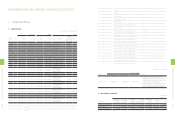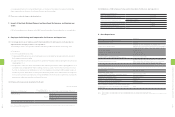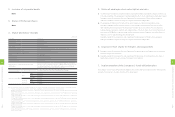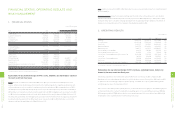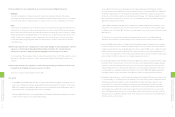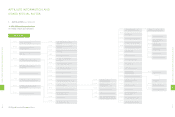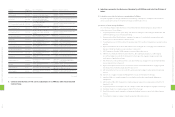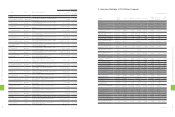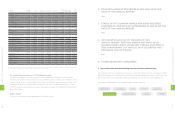HTC 2012 Annual Report Download - page 57
Download and view the complete annual report
Please find page 57 of the 2012 HTC annual report below. You can navigate through the pages in the report by either clicking on the pages listed below, or by using the keyword search tool below to find specific information within the annual report.
(4) We work hard to maximize the productivity of each of our business chain, enhance time management, standardize
workflows and fully implement ISO quality control practices in order to improve competitiveness through efficient
process, reduced communications costs and comprehensive quality management.
(5) As the fastest growing sector of Taiwan's economy, the electronics industry requires a steady stream of human
resources. Downsizing in the manufacturing sector has increased the difficulty in hiring entry-level workers. HTC
plans to continue to hire foreign workers and work with schools to help increase domestic hiring in the future.
2. Risk Factors
The following describes identified risks and related mitigating measures.
(1) Interest, forex, and inflation rate risks and mitigating measures
Impact on HTC profitability:
Item 2012
(NT$1,000 or %)
Net Interest Income 615,920
Net Forex Income 684,300
Net Interest Income as percentage of net revenue 0.21%
Net Interest Income as percentage of Earnings Before Tax 3.17%
Net Forex Income as percentage of net revenue 0.24%
Net Forex Income as percentage of Earnings Before Tax 3.52%
Note: Calculated on HTC consolidated financial numbers
Working capital required to support the expansion of HTC business operations has over recent years been
supplied exclusively from internal finances. As the corporation has not taken out long-term loans, fluctuations
in interest rates have had no effect on the Company's liabilities. HTC is prudent in its financial policies, and our
asset allocation decisions prioritize security and fluidity, with most funds kept in time deposit accounts. In 2012,
HTC interest income totaled NT$616 million.
HTC's revenues are denominated primarily in US dollars (USD) and euros (EUR). Manufacturing costs are
denominated primarily in US dollars. Forex fluctuations have the potential to impact HTC revenues, operating costs
and operating profits. Apart from efficient management of the quality and payment cycles of its foreign currency-
denominated accounts receivable, HTC uses forward exchange contracts to minimize its forex risk. At the close
of 2012, financial derivatives held by HTC related to exchange risk were valued at USD340 million, EUR146 million,
GBP20.7 million, JPY8,097 million, CNH 1,148 million and CAD21.9 million. Fair value of the derivatives changes as
a result of forex fluctuations. A decrease of 1% in the quoted exchange rate of any one of the abovementioned
currencies against the NT dollar would result in a derivatives holding benefit to HTC of approximately NT$252 million.
During 2012, the euro depreciated against the NT dollar from 1:39 to 1:36, but appreciated against the NT dollar
to 1:38 at the end of the year. The US dollar declined from 1:30.3 against the NT dollar to approximately 1:29.1. Net
exchange income earned during 2012 totaled NT$684 million. Under effective management by the Company,
negative effects of exchange rate fluctuations on profits in recent years have been minimal.
(3) Diverse and growing universe of mobile digital services drives smartphone market penetration
New mobile phone operating systems such as Android and iOS, which permit easy app store downloading
of social networking, shopping, travel, game and other software, are attracting even more consumers to
the ranks of smartphone users. Smartphone industry is now in the strong growing stage, and telecom
operators' aggressively rollout of 4G fastest mobile Internet networks to stimulate growth even further.
These developments should all have a positive impact on HTC business growth prospects.
(4) Instilling a positive corporate culture enhances organizational flexibility and responsiveness
HTC promotes a unique corporate culture that is designed to instill passion for innovation and commitment to
the highest standards. Our lack of barriers between departments promotes synergy and dynamism even further.
HTC's highly efficient operations have been affirmed by numerous international quality standards including ISO-
9001, ISO-14001, ISO-14064-1, TL-9000, and OHSAS 18001. Outstanding in-house research and development
capabilities give HTC the competitive edge to reach the market first with many industry leading innovations and
features.
(5) Comprehensive domestic industry base supports current and future growth needs
Active government and private sector efforts to grow the domestic high tech sector in recent decades have given
Taiwan a strong foundation of skilled researchers and technicians. Taiwan is further benefiting from the increase of
industry supply and support systems and industry clustering effects. In addition to making it easier for us to recruit
and retain personnel, these developments allow us to cooperate with domestic and international suppliers in order to
lower purchase costs and respond even faster to industry trends and changes in.
• Factors Adverse to the Achievement of HTC Growth Goals and Relevant
Countermeasures
Many current and potential competitors are now active in the smartphone market looking to benefit from the
rapid growth and demand of smartphone technologies. Competition is expected to continue to intensify as the
smartphone user base grows, smartphone functions and features increase, and smartphone model lifecycles
shorten. The following outlines HTC measures and response to such challenges.
(1)
We work actively to establish HTC's brand value, enhance global brand recognition and preference, and leverage
effective brand management activities and product promotions to establish the HTC brand as consumers' "first
choice" in smartphones.
(2) We emphasize innovation to maintain a leading competitive edge. Product differentiation and innovations in
user experience allow us to develop a wide range of products tailored to meet diverse consumer needs. HTC
Sense® is designed with customer at the center to make mobile phones more intuitive and easy to use.
(3) We upgrade our materials requirement planning (MRP) system to improve our ability to manage material
inventories, anticipate future demand in order to drive efficient inventory costs and reduce inventory devaluation
risks. We continue to build and diversify supplier relationships to enhance supply stability. Our objectives are
consistent and uninterrupted supply of all materials. HTC's leadership in the industry helps ensure that suppliers
accommodate and meet HTC priorities in expanding market sales. This helps mitigate risks related to reliance on
overseas suppliers for critical components. We also cultivated strategic business relationship with our suppliers.
1
1
0
6
FINANCIAL STATUS, OPERATING
RESULTS AND RISK MANAGEMENT
1
1
1
6
FINANCIAL STATUS, OPERATING
RESULTS AND RISK MANAGEMENT





